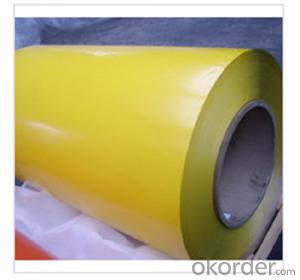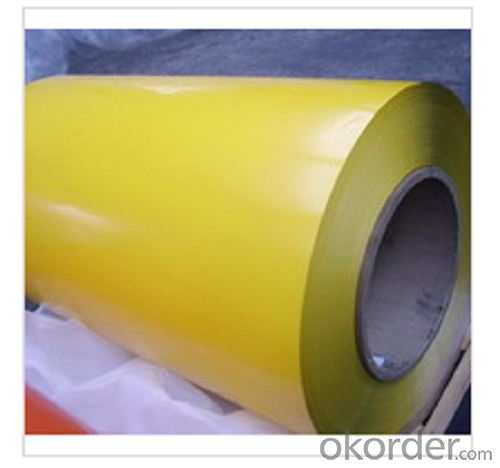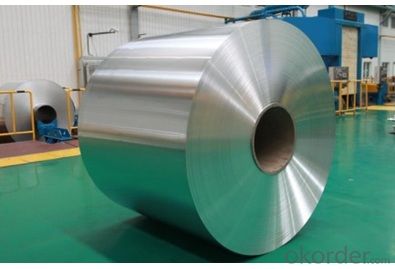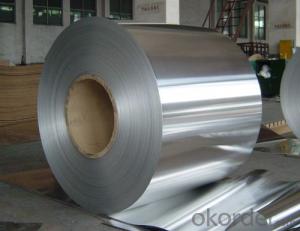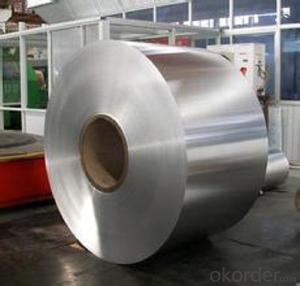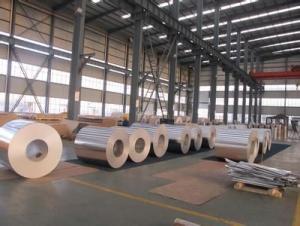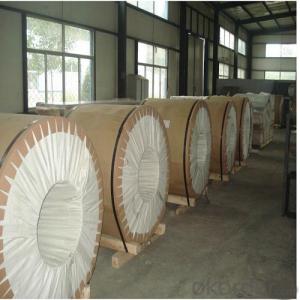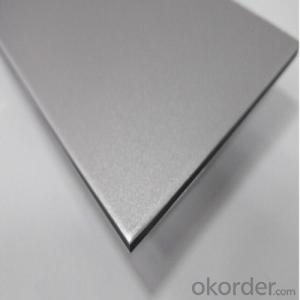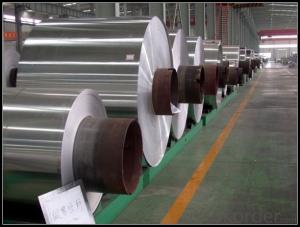Brushed Nickel Aluminum Coil - High Quality Aluminum Sheet Coil at Best Prices
- Loading Port:
- China main port
- Payment Terms:
- TT OR LC
- Min Order Qty:
- 10 m.t
- Supply Capability:
- 1000 m.t/month
OKorder Service Pledge
OKorder Financial Service
You Might Also Like
Specification
The Specification of Coated Aluminium Coil
1)Coil width:upon request,max up to 1550mm
2)Coil thickness:0.02-3.0mm
3)Internal diameter: 150mm, 405mm, 505mm
4)Coil weight: 1.5-4MT/coil
5)Coating: PE & PVDF color paiting
Pop-Up Foil Sheets are individual sheets of Aluminum coil. Wrappers are so easy to use with all your foods because they pop up one-at-a-time and require no cutting or tearing! Use them for wrapping food to go, as portable place mats, wrapping sandwiches, protecting counters during meal preparation, when making snacks or to store food in the refrigerator.
PVDF Coated:
Coated Aluminum Coil features with super durability and weather resistance,and better properties to anti-acid,anti-alkali,keeping more than 15 years without fading in using as external wall cladding.
The Main Features of Aluminium Coated Coil:
High quality with competive prices.
Wide product range of choice.
We are specific manufacture and control.
The Images of Aluminium Coated Coil:
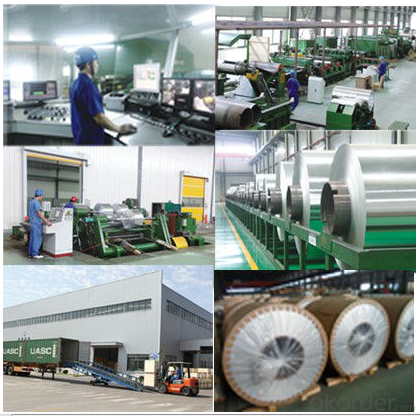
FAQ:
Q: Can you provide free samples?
A: Yes, free samples will be sent to you on freight at destination.
Q: Can I get your latest catalogue?
A: Yes, it will be sent to you in no time.
Q: What is the MOQ?
A: 5 tons
Q: What are your payment terms?
A: We accept L/C,T/T, West Union,etc.
- Q: Can aluminum coils be used in food processing applications?
- Yes, aluminum coils can be used in food processing applications. Aluminum is a highly versatile and commonly used material in the food industry because of its numerous benefits. Aluminum coils are lightweight, durable, and have excellent thermal conductivity, making them ideal for applications that require even and efficient heat transfer. In food processing, aluminum coils are often used in equipment such as heat exchangers, evaporators, and refrigeration units. They are used to cool, heat, or maintain the temperature of various food products during processing, storage, or transportation. The excellent thermal conductivity of aluminum ensures that heat is evenly distributed, helping to preserve the quality and taste of the food. Additionally, aluminum is a non-toxic and non-reactive metal, which means it does not affect the flavor or composition of the food being processed. It also has a natural resistance to corrosion, ensuring that the coils do not contaminate the food and are easy to clean and maintain. Furthermore, aluminum is a sustainable and recyclable material, aligning with the growing demand for environmentally friendly practices in the food industry. Its lightweight nature also contributes to energy efficiency and reduced transportation costs. Overall, aluminum coils are a safe, efficient, and reliable choice for food processing applications, meeting the stringent requirements of the industry while maintaining the quality and safety of the processed food.
- Q: Guangdong where there are professional to do around the paper corner, is packing steel coil, aluminium coil that protect the edge of the both ends of the cylinder. Just the kind of picture.
- Guangdong Province, professional Foshan recommended edgeboard around Foshan Ansheng packaging. They are very professional in their circle, L shaped, and curved corners.
- Q: What is the corrosion resistance of aluminum coils in saltwater environments?
- Aluminum coils have excellent corrosion resistance in saltwater environments. This is due to the formation of a protective oxide layer on the surface of the aluminum, which acts as a barrier against corrosion. This oxide layer prevents the saltwater from coming into direct contact with the aluminum, effectively reducing the risk of corrosion. Additionally, aluminum is inherently resistant to saltwater corrosion because it is a relatively inert metal. As a result, aluminum coils are commonly used in various marine applications, such as boat hulls, offshore structures, and saltwater cooling systems. However, it is important to note that prolonged exposure to saltwater can still result in some level of corrosion over time. Regular maintenance and appropriate protective coatings can help enhance the longevity and performance of aluminum coils in saltwater environments.
- Q: What are the different coil coating options available for aluminum coils?
- There are several different coil coating options available for aluminum coils, each offering unique benefits and properties. 1. Polyester: Polyester coil coating is a popular choice due to its durability and cost-effectiveness. It provides good resistance to weathering, UV rays, and chemical exposure. Polyester coatings are available in a wide range of colors and finishes, making them suitable for various aesthetic applications. 2. Polyvinylidene Fluoride (PVDF): PVDF coatings offer superior durability and resistance to UV rays, weathering, and chemicals. They have excellent color retention and can withstand harsh environmental conditions. PVDF coatings are commonly used in architectural applications where long-term durability and aesthetics are critical. 3. Polyurethane: Polyurethane coil coatings provide excellent adhesion, flexibility, and impact resistance. They are known for their high gloss and vibrant colors. Polyurethane coatings are often used in applications requiring superior resistance to abrasion, such as appliances and automotive components. 4. Epoxy: Epoxy coil coatings offer excellent corrosion resistance and adhesion properties. They are commonly used in industrial applications where protection against chemicals and harsh environments is required. Epoxy coatings can be applied as a primer or a topcoat, depending on the specific requirements. 5. Acrylic: Acrylic coil coatings provide good weather resistance, color retention, and gloss. They are often used in outdoor applications where exposure to UV rays and environmental conditions is a concern. Acrylic coatings can be formulated to achieve different levels of durability and flexibility. 6. Silicone Modified Polyester (SMP): SMP coil coatings combine the benefits of polyester and silicone, offering enhanced weather resistance and durability. They provide excellent color retention, gloss retention, and resistance to chalking. SMP coatings are commonly used in architectural and industrial applications. It is important to consider the specific requirements of the application, including durability, aesthetics, and environmental conditions, when selecting the appropriate coil coating option for aluminum coils. Consulting with a coil coating expert can help determine the best option based on the desired performance and appearance.
- Q: Can aluminum coils be used in wastewater treatment plants?
- Yes, aluminum coils can be used in wastewater treatment plants. Aluminum coils are commonly used in the construction of heat exchangers, which are essential components in wastewater treatment plants. Heat exchangers are used to transfer heat from the wastewater to the treatment process, helping to optimize the treatment efficiency and reduce energy consumption. Aluminum coils are preferred in some cases due to their excellent thermal conductivity, lightweight, and resistance to corrosion, making them suitable for the harsh environment of wastewater treatment plants. Additionally, aluminum coils are cost-effective and have a long lifespan, making them a reliable choice for use in wastewater treatment facilities.
- Q: Are aluminum coils suitable for roofing applications?
- Indeed, roofing applications can indeed make use of aluminum coils. Aluminum, as a material, possesses the qualities of being lightweight and durable, thus making it advantageous for roofing projects. In terms of corrosion resistance, aluminum excels, which is crucial in safeguarding roofs from weather elements like rain, snow, and UV radiation. Furthermore, aluminum is fire-resistant, ensuring safety in roofing applications. Moreover, aluminum coils possess high malleability, allowing for effortless shaping and installation on various roof designs. They are also obtainable in an extensive array of colors and finishes, providing aesthetic choices for different architectural styles. All in all, the durability, versatility, and aesthetic appeal of aluminum coils contribute to their popularity in roofing applications.
- Q: What house hold materials contain 100% pure aluminum. or where can i buy it. im making thermite, which ive made before so don't say, its dangerous don't do it, but do i need 100% pure aluminum or will some aluminum alloy with like 90% aluminum work?????
- Aluminum foil is your best bet. According the the Reynold's wrap web site, their foil is 98.5% aluminum.
- Q: Can recycled aluminum coils be reused to create new ones, or are they only suitable for disposal?
- <p>Old aluminum coils can indeed be recycled and used to make new ones. Recycling aluminum is an efficient process that conserves resources and reduces energy consumption compared to mining and refining new aluminum. The recycling process involves melting the old coils, which can then be reshaped into new coils without losing any of their properties. This makes recycling aluminum coils a sustainable and environmentally friendly alternative to disposal.</p>
- Q: How are aluminum coils used in heat exchangers?
- Aluminum coils are widely used in heat exchangers due to their excellent thermal conductivity and corrosion resistance properties. Heat exchangers are devices that transfer thermal energy between two or more fluids, and aluminum coils play a crucial role in facilitating this heat transfer process. In a typical heat exchanger, aluminum coils are used as the primary component for the heat transfer surface. These coils are usually made of thin aluminum sheets that are formed into a tube-like shape, creating a large surface area for efficient heat transfer. The coils are often arranged in a serpentine pattern to maximize the contact area between the fluid being heated or cooled and the coil surface. The fluid that needs to be heated or cooled passes through the coil, while another fluid, usually water or air, flows over the coil surface. As the fluids come into contact with the aluminum coil, heat is transferred from one fluid to the other through conduction. The high thermal conductivity of aluminum allows for quick and efficient heat transfer, resulting in effective temperature control. Moreover, aluminum coils are highly resistant to corrosion, which is crucial for heat exchangers that come into contact with various fluids, some of which may be corrosive. This corrosion resistance ensures the longevity and durability of the heat exchanger, reducing maintenance and replacement costs. Additionally, aluminum coils are lightweight and easily formable, making them suitable for different heat exchanger designs and configurations. This flexibility allows manufacturers to create compact and space-efficient heat exchangers that can be installed in various applications, such as HVAC systems, refrigeration units, automotive radiators, and industrial processes. In conclusion, aluminum coils are used in heat exchangers due to their excellent thermal conductivity, corrosion resistance, lightweight nature, and formability. These coils effectively transfer heat between fluids, ensuring efficient temperature control and enabling the proper functioning of various heating and cooling systems.
- Q: Are there any limitations to using aluminum coils?
- Yes, there are certain limitations to using aluminum coils. One limitation is that aluminum has a lower tensile strength compared to other metals like steel, making it more prone to damage or deformation under heavy loads or impacts. Additionally, aluminum coils can be susceptible to corrosion if not properly protected or coated. Finally, aluminum coils may not be suitable for applications that require high electrical conductivity, as aluminum has a lower conductivity compared to copper.
Send your message to us
Brushed Nickel Aluminum Coil - High Quality Aluminum Sheet Coil at Best Prices
- Loading Port:
- China main port
- Payment Terms:
- TT OR LC
- Min Order Qty:
- 10 m.t
- Supply Capability:
- 1000 m.t/month
OKorder Service Pledge
OKorder Financial Service
Similar products
Hot products
Hot Searches
Related keywords
